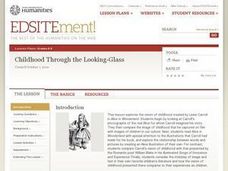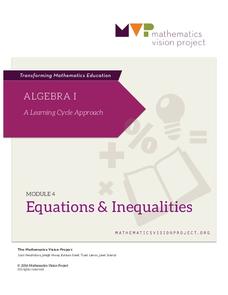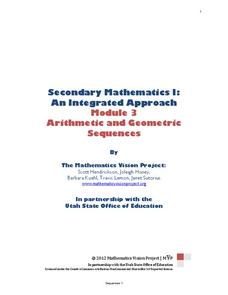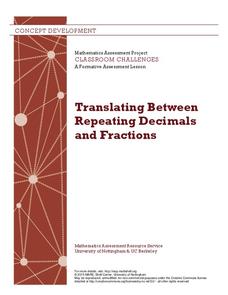Curated OER
Childhood Through the Looking-Glass
Junior high learners discuss Lewis Carroll's classic story, Alice in Wonderland. They observe the image of childhood in his photographs and compare them to present-day images. There is a plethora of ideas and links for discussions...
Curated OER
Math News
Young writers design and publish a newsletter with articles that demonstrate knowledge of mathematical concepts. They explain mathematical procedures and basic operations in a news article format. Next, they compile several articles to...
EngageNY
Arithmetic and Geometric Sequences
Arithmetic and geometric sequences are linear and geometric patterns. Help pupils understand the relationship and see the connection with an activity that asks them to write the rules and classify the patterns correctly. A sorting...
Curated OER
Using a Hundreds Chart
Youngsters participate in three activities using the hundreds chart. They will choose numbers to add up to one hundred. Whoever gets the most combinations wins. Two variations of the game are supplied.
Inside Mathematics
Swimming Pool
Swimming is more fun with quantities. The short assessment task encompasses finding the volume of a trapezoidal prism using an understanding of quantities. Individuals make a connection to the rate of which the pool is filled with a...
Illustrative Mathematics
Equality Number Sentences
Understanding the concept of equality is fundamental to the success of young mathematicians. To explore this basic idea, children compare the dots arranged in pairs of rectangles in order to determine whether or not they contain an equal...
Curated OER
The Sum of Our Integer Intelligences
Young mathematicians explore integers. They review adding integers through engaging in mathematical labs. Each lab station is designed to reflect one of the multiple intelligences. Resources for all activities are provided.
Kenan Fellows
Math Made Simple as 1-2-3: Simplified Educational Approach to Algebra
Writing an equation of a line is as easy as m and b. A lesson presentation gives individuals different strategies for writing equations of lines. Some items provide a slope and a point while others provide two points. Whatever the given,...
Mathematics Vision Project
Module 4: Equations and Inequalities
Can you justify that mathematically? Help learners see the process of solving as using mathematical properties rather than a set of steps to memorize in the fourth module of a nine-part Algebra I series. The module contains six...
02 x 02 Worksheets
Dividing Polynomials Using Algebra Tiles
Discover how algebra tiles can help in dividing polynomials. Pupils watch as instructors demonstrate how to use algebra tiles to solve problems involving the division of a quadratic expression by a linear expression. Once they get the...
Illustrative Mathematics
Delivery Trucks
Algebra learners are to make sense of two different-sized sand trucks and the number of trips each truck makes. The resource lists four different expressions based on the size of each truck and the number of deliveries the trucks make....
Mathematics Vision Project
Module 3: Arithmetic and Geometric Sequences
Natural human interest in patterns and algebraic study of function notation are linked in this introductory unit on the properties of sequences. Once presented with a pattern or situation, the class works through how to justify...
Mathematics Assessment Project
Translating Between Repeating Decimals and Fractions
Model for your young mathematicians the process for converting repeating decimals to fractions. To demonstrate their understanding of the process, class members then complete and assessment task and participate in an activity matching...
Curated OER
Proofs Of The Pythagorean Theorem?
Even U.S. President James Garfield had his own proof of the Pythagorean Theorem! Pupils consider three different attempts at a geometric proof of the Pythagorean Theorem. They then select the best proof and write paragraphs detailing...
California Education Partners
Soccer Snacks
Make the cookies healthy. The assessment task asks pupils to determine the number of cookies they could make based on a given amount of ingredients. Given two sugar substitutes, learners determine which substitute would be better and...
Illustrative Mathematics
Fraction Equivalence
Why is six-tenths equivalent to sixty-hundredths? This is the question learners are tasked to explain in writing as well as with a picture.
California Education Partners
Four Square Wars
Obviously, four is the perfect number when you're playing Four Square. Scholars first use multiplication and division to solve a set of problems on the number of balls needed, the number of games, and the number of players required for a...
5280 Math
Stories That Formulas Tell
Learn the stories a formula holds. An interesting lesson takes a unique approach to teach how to use formulas. Beginning with a formula, learners predict what the variables stand for and then use the formula to make calculations and tell...
Curated OER
Narrow Corridor
Buying a new sofa? Learn how to use the Pythagorean Theorem, as well as algebra and graphing techniques, to determine whether the sofa will fit around a corner (which I'm sure you'll agree is a very important consideration!).
Balanced Assessment
Larger, Smaller, In-Between I
Determine the level of understanding of decimal and fraction values within your classes with a resource that provides pupils with opportunities to practice with decimal and fraction concepts.
Balanced Assessment
Bagels or Donuts
Explore business problems through mathematical analysis. The task has individuals write and graph a linear system to determine the best business model. They use their models to answer a series of questions that help to make a conclusion.
Illustrative Mathematics
Comparing Numbers
Young mathematicians spin their way to a deeper number sense with this fun, collaborative activity. Using two spinners, one with the numbers 0-9 and the other with the decades 00-90, pairs of students take turns building and comparing...
Utah Education Network (UEN)
Ratio Relations
At this rate, the class will be experts on ratios and rates in no time. A class workbook teaches individuals about ratio language, using tables and tape diagrams to find equivalent ratios, and solving ratio problems. They then discover...
Missouri Department of Elementary
Respecting Differences
Differences make the world go 'round. Using a worksheet, scholars identify the similarities and differences that they have with their classmates. Next, pupils engage in a whole-class discussion about respecting differences in others.























